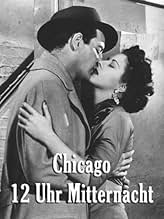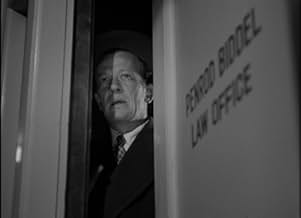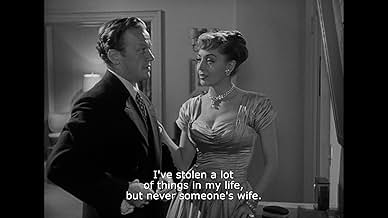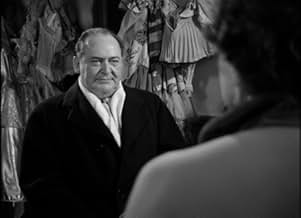CALIFICACIÓN DE IMDb
6.7/10
1.8 k
TU CALIFICACIÓN
Agrega una trama en tu idiomaJohnny Kelly, who plans on resigning from the police force and leaving his wife the next day, has a very eventful last night on duty.Johnny Kelly, who plans on resigning from the police force and leaving his wife the next day, has a very eventful last night on duty.Johnny Kelly, who plans on resigning from the police force and leaving his wife the next day, has a very eventful last night on duty.
- Dirección
- Guionista
- Elenco
Tom Poston
- Detective
- (as Thomas Poston)
Roy Barcroft
- Mechanical Man Attraction Hawker
- (voz)
- (sin créditos)
Helen Gibson
- Woman
- (sin créditos)
- Dirección
- Guionista
- Todo el elenco y el equipo
- Producción, taquilla y más en IMDbPro
Opiniones destacadas
I can't wait to see the DVD release of this film with the features and commentary because it is one of those rare Noir films that stay with you. Not so much for the average domestic problems that Gig Young's character displays but more for his relationship with Mala Powers and their great quotable lines:
Sally "Angel Face" Connors, dressed in a stripper's costume to Johnny Kelly- "Come here." Kelly's reply: "I've been there."
And Angel Face's great speech explaining her disillusionment: "I'm sick of this town. I'm with you Johnny. When I first came to this town I was gonna be... oh there were a lotta things I was gonna be- become famous. But Chicago's the big melting pot, and I got melted but good".
And there are also the throw-away lines in the bar: Waitress to Bartender: "Two Old Fashions- no ice, no water, no sugar, no grenadine".
"City That Never Sleeps" has a light step and has so many quirky little characters that you might wonder who the story is about. The film does focus on certain characters to make its point, is sometimes great to look at for its night-lit location photography and has some nice noir humor.
Gig Young has the unflappable charm and bon vivant attitude that almost gets in the way of his disillusioned cop Johnny Kelly. Kelly is the ultimate Everyman who has become a cop because his father wanted him to, and whose wife unwittingly emasculates him because she earns more money that he.
All in all, "City That Never Sleeps" is worth catching for its noir look and some good performances.
Sally "Angel Face" Connors, dressed in a stripper's costume to Johnny Kelly- "Come here." Kelly's reply: "I've been there."
And Angel Face's great speech explaining her disillusionment: "I'm sick of this town. I'm with you Johnny. When I first came to this town I was gonna be... oh there were a lotta things I was gonna be- become famous. But Chicago's the big melting pot, and I got melted but good".
And there are also the throw-away lines in the bar: Waitress to Bartender: "Two Old Fashions- no ice, no water, no sugar, no grenadine".
"City That Never Sleeps" has a light step and has so many quirky little characters that you might wonder who the story is about. The film does focus on certain characters to make its point, is sometimes great to look at for its night-lit location photography and has some nice noir humor.
Gig Young has the unflappable charm and bon vivant attitude that almost gets in the way of his disillusioned cop Johnny Kelly. Kelly is the ultimate Everyman who has become a cop because his father wanted him to, and whose wife unwittingly emasculates him because she earns more money that he.
All in all, "City That Never Sleeps" is worth catching for its noir look and some good performances.
Unless you've the skill of an O. Henry, it's pretty ridiculous to talk about the spirit of a city, even as a generalization. But when that "spirit" takes human form and joins the local police force, really it's too much! Whatever induced scriptwriter Steve Fisher to introduce this bizarrely extraneous element into his otherwise tight little tale of the seamier side of Chicago, it was a mistake.
Fortunately, the assignment was handed to John H. Auer, who was most definitely the class director of the Republic stable. The action scenes here are handled with his usual vigorous finesse and there's plenty of excitement. The movie was actually lensed on location in Chicago, the city's streets made forcefully real by John Russell's deft photography.
Gig Young registers okay as the hero, while Chill Wills is saddled with the "spirit". However there are top performances by seasoned players like Edward Arnold, Marie Windsor, William Talman, Paula Raymond, and Wally Cassell as the mechanical man. Mala Powers is suitably cast as "Angel Face".
Fortunately, the assignment was handed to John H. Auer, who was most definitely the class director of the Republic stable. The action scenes here are handled with his usual vigorous finesse and there's plenty of excitement. The movie was actually lensed on location in Chicago, the city's streets made forcefully real by John Russell's deft photography.
Gig Young registers okay as the hero, while Chill Wills is saddled with the "spirit". However there are top performances by seasoned players like Edward Arnold, Marie Windsor, William Talman, Paula Raymond, and Wally Cassell as the mechanical man. Mala Powers is suitably cast as "Angel Face".
Chicago cop Johnny Kelly wants to run away, from his job with the police force, and from his perceived mundane marriage. Hoping to flee Chicago with his stripper girlfriend Angel Face, he keeps putting it off with bouts of cold feet. Then one night when Johnny is assigned a new partner, Angel finally grows tired of false hopes and promises, just as Johnny is tempted by the dark side to finally realise both their dreams, but other factors are heading their way.....
Directed by John H. Auer and starring Gig Young as Kelly, City That Never Sleeps was brought to us out of the low budget Republic Pictures studio. Oddly fusing film-noir with fantastical elements makes for a most intriguing watch, yet it's very much a slog to get to a point where you feel your time has been worth it. But crucially it is worth the wait, lots of character strands all thread together to give us an exciting, and well executed climax, tho the fantastical finish point is something of a head scratcher to me personally. It's a weird film in many ways, and one that probably needs repeat viewings to fully grasp {and appreciate} what the hell is going on with all these characters. The weird feel is emphasised by John L. Russell's {Psycho & The Cabinet of Caligari} grimly lighted photography, who utilises the sparseness of the actual Chicago locations to great effect.
Known to be a favourite film of Martin Scorsese, City That Never Sleeps is actually a little better than it's B movie tagging. But it remains a film that one feels should have been much better. It's alright to fuse more than a couple of genre's, but you have to make it work convincingly within the structure of the plot{s}, and realistically they only just manage to pull it off, courtesy of a fine, if weird, ending. 6/10 but it could go either way upon a further viewing.
Directed by John H. Auer and starring Gig Young as Kelly, City That Never Sleeps was brought to us out of the low budget Republic Pictures studio. Oddly fusing film-noir with fantastical elements makes for a most intriguing watch, yet it's very much a slog to get to a point where you feel your time has been worth it. But crucially it is worth the wait, lots of character strands all thread together to give us an exciting, and well executed climax, tho the fantastical finish point is something of a head scratcher to me personally. It's a weird film in many ways, and one that probably needs repeat viewings to fully grasp {and appreciate} what the hell is going on with all these characters. The weird feel is emphasised by John L. Russell's {Psycho & The Cabinet of Caligari} grimly lighted photography, who utilises the sparseness of the actual Chicago locations to great effect.
Known to be a favourite film of Martin Scorsese, City That Never Sleeps is actually a little better than it's B movie tagging. But it remains a film that one feels should have been much better. It's alright to fuse more than a couple of genre's, but you have to make it work convincingly within the structure of the plot{s}, and realistically they only just manage to pull it off, courtesy of a fine, if weird, ending. 6/10 but it could go either way upon a further viewing.
...is but one of the many elements in this quirky film that makes it SO enjoyable. The plot is complex, but still masterfully laid out, the dialogue is clean and effective, and the imaginative direction, lighting, cinematography and editing clearly place "City" in the ranks of minor classics.
In fact, you are rarely aware that this was a low-budget Republic Studios pic. There's one scene near the end...the standard "calling all cars" scene in the police station, which could have been shot with a single guy at a microphone with a bare wall behind him; instead, we see a bee-hive of activity, with several radio cops reflected in a magical labyrinth of glass panes, with shadowy figures passing through the hallway in back of them. It's seemingly insignificant details such as this that keep "City" bristling with intense visuals and character interplay from beginning to end (yeah, the scene with William Talman breaking into Edward Arnold's office at night could have been edited down to about half its length, and the continually recurring stock footage of the police car's POV while racing past a bunch of 1940's parked cars is pretty comical).
Having a heavyweight actor like Arnold in a pivotal role lends acting "gravitas"; William Talman, an actor I've never really cared for, is superb---subtle, cunning, and ultimately maniacal. The confusion between John Kelly Sr. and Jr. as the tension builds is but one of the masterful plot devices, and the subplot of the Mechanical Man (Wally Cassell) and his dreams of an idyllic life with his lady love amidst the wonders of nature is positively brilliant, as is his change of heart and willingness to sacrifice himself for a noble cause. Cassell's physical skill is as impressive as the emotional sensitivity he brings to the role* And how about mother-in-law's offstage nagging of Gig Young? I found it subtly creepy, almost like mother's voice in PSYCHO.
On top of it all, we have the Chill Wills character; you must decide for yourself if it helps or harms the film; I took it as just another off-beat element in this imaginative story of a single night in Chicago. Who knows?--maybe the whole thing was a bad dream from which Gig Young wakes up at the end.
Only Mala Powers disappoints in her role; she was rather miscast as the tough, world-weary dame, though her more sensitive scenes are fine.
* NOTE - The December 22nd, 1960 episode of TV's June Allyson Show was entitled "SILENT PANIC", and featured HARPO MARX as a deaf-mute who works at Christmastime as a Mechanical Man in a department store window; he also happens to be the only eyewitness to a murder on the street. Sound familiar? Unfortunately, the hour-long show fails miserably to live up to its fascinating premise. But I wonder how many other films, radio shows, stories, etc have used this novel plot device over the years.
In fact, you are rarely aware that this was a low-budget Republic Studios pic. There's one scene near the end...the standard "calling all cars" scene in the police station, which could have been shot with a single guy at a microphone with a bare wall behind him; instead, we see a bee-hive of activity, with several radio cops reflected in a magical labyrinth of glass panes, with shadowy figures passing through the hallway in back of them. It's seemingly insignificant details such as this that keep "City" bristling with intense visuals and character interplay from beginning to end (yeah, the scene with William Talman breaking into Edward Arnold's office at night could have been edited down to about half its length, and the continually recurring stock footage of the police car's POV while racing past a bunch of 1940's parked cars is pretty comical).
Having a heavyweight actor like Arnold in a pivotal role lends acting "gravitas"; William Talman, an actor I've never really cared for, is superb---subtle, cunning, and ultimately maniacal. The confusion between John Kelly Sr. and Jr. as the tension builds is but one of the masterful plot devices, and the subplot of the Mechanical Man (Wally Cassell) and his dreams of an idyllic life with his lady love amidst the wonders of nature is positively brilliant, as is his change of heart and willingness to sacrifice himself for a noble cause. Cassell's physical skill is as impressive as the emotional sensitivity he brings to the role* And how about mother-in-law's offstage nagging of Gig Young? I found it subtly creepy, almost like mother's voice in PSYCHO.
On top of it all, we have the Chill Wills character; you must decide for yourself if it helps or harms the film; I took it as just another off-beat element in this imaginative story of a single night in Chicago. Who knows?--maybe the whole thing was a bad dream from which Gig Young wakes up at the end.
Only Mala Powers disappoints in her role; she was rather miscast as the tough, world-weary dame, though her more sensitive scenes are fine.
* NOTE - The December 22nd, 1960 episode of TV's June Allyson Show was entitled "SILENT PANIC", and featured HARPO MARX as a deaf-mute who works at Christmastime as a Mechanical Man in a department store window; he also happens to be the only eyewitness to a murder on the street. Sound familiar? Unfortunately, the hour-long show fails miserably to live up to its fascinating premise. But I wonder how many other films, radio shows, stories, etc have used this novel plot device over the years.
"City That Never Sleeps" is one of the strangest film noir movies I have seen--mostly because there is a real surreal aspect to the story that you just don't find in other noir pictures. I don't want to tell you more about this...suffice to say that one of the characters is VERY unusual and you learn just how unusual at the close of the movie.
Gig Young plays Johnny Kelly, a disaffected cop who is very unhappy in his marriage and is contemplating running off with his mistress, a stripper, and quitting his job on the force. When you see and hear why Johnny is unhappy, you do feel a bit sorry for him, as his evil mother-in-law lives with them and CONSTANTLY harangues him about his wife earning more than him! Instead of belting the old broad in the mouth (definitely a noir way of handling it) he plans on just leaving...for good. But before he does this he has one more night on the job...and a very eventful night it is. While there is MUCH more to the story and a plot involving William Talman who plays an amazingly cold and vicious killer, I think it's best you just see the film for yourself.
The big reveal at the end will determine whether you like this film or not...see the picture and see what I mean. I'd like to say more...but again, just see it for yourself. And, if you want to see it, it's currently up on YouTube.
Gig Young plays Johnny Kelly, a disaffected cop who is very unhappy in his marriage and is contemplating running off with his mistress, a stripper, and quitting his job on the force. When you see and hear why Johnny is unhappy, you do feel a bit sorry for him, as his evil mother-in-law lives with them and CONSTANTLY harangues him about his wife earning more than him! Instead of belting the old broad in the mouth (definitely a noir way of handling it) he plans on just leaving...for good. But before he does this he has one more night on the job...and a very eventful night it is. While there is MUCH more to the story and a plot involving William Talman who plays an amazingly cold and vicious killer, I think it's best you just see the film for yourself.
The big reveal at the end will determine whether you like this film or not...see the picture and see what I mean. I'd like to say more...but again, just see it for yourself. And, if you want to see it, it's currently up on YouTube.
¿Sabías que…?
- TriviaFirst credited feature film for actor-comedian Tom Poston.
- ErroresStuntman Dale Van Sickel is clearly seen instead of actor William Talman in the shot where Hayes Stewart jumps over the skylight during the rooftop chase.
- Citas
Sally 'Angel Face' Connors: When I first came to this town I was gonna be - oh, there were a lot of things I was gonna do. Become famous. But Chicago's the big melting pot, and I got melted, but good.
- Créditos curiososThis motion picture is respectfully dedicated to the police and police departments of America - a brave army of men and women who form our first line of defense in preserving our sacred principles of personal liberty and justice. We gratefully acknowledge the valuable assistance given by the City of Chicago and its police and Police Department, whose cooperation made this picture possible.
- ConexionesReferenced in Ôsaka no yado (1954)
Selecciones populares
Inicia sesión para calificar y agrega a la lista de videos para obtener recomendaciones personalizadas
- How long is City That Never Sleeps?Con tecnología de Alexa
Detalles
- Tiempo de ejecución
- 1h 30min(90 min)
- Color
- Relación de aspecto
- 1.37 : 1
Contribuir a esta página
Sugiere una edición o agrega el contenido que falta
































